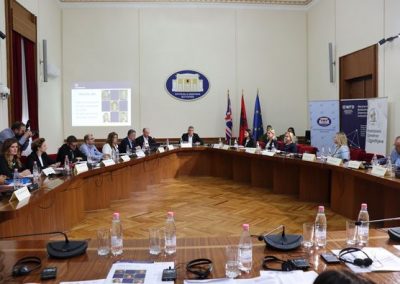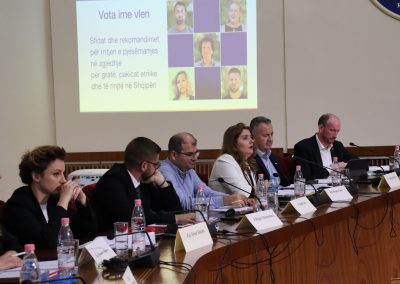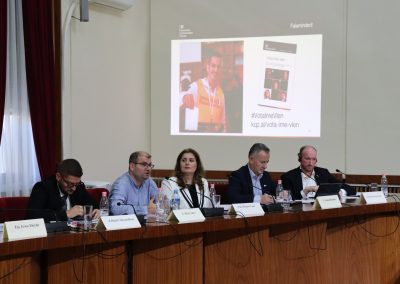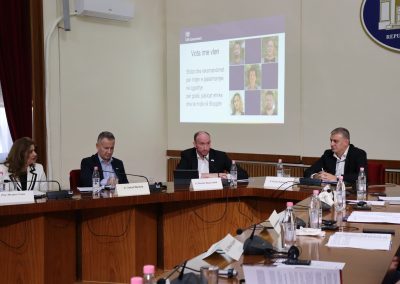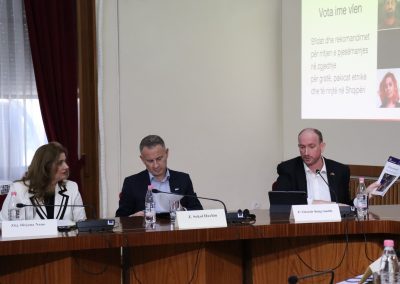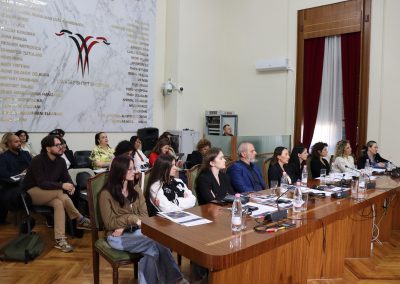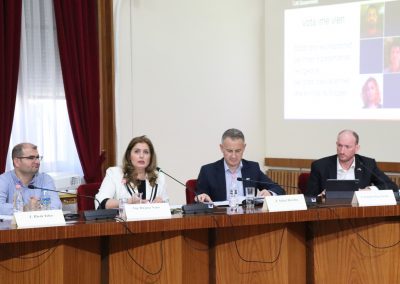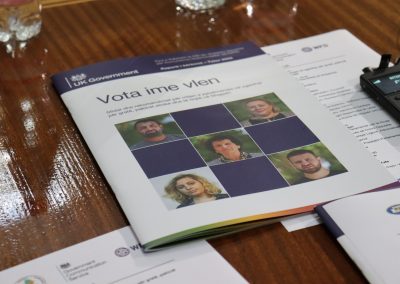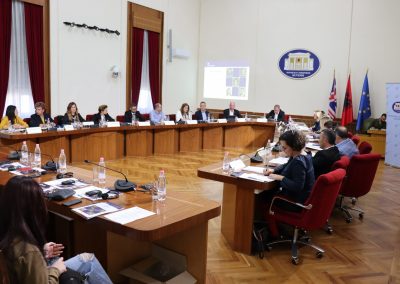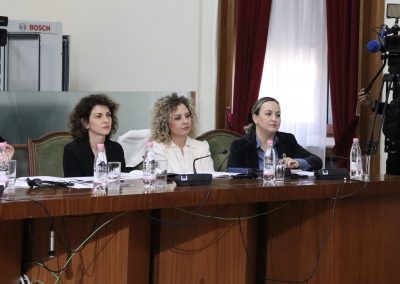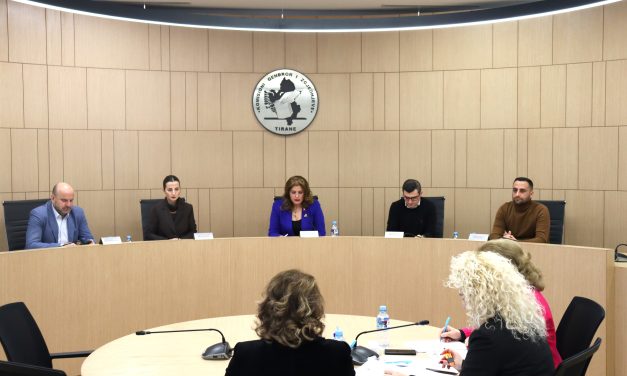The electoral report “My vote matters” was published today in the Albanian Parliament and it recommended that political parties, the media and the Central Election Commission should not prevent marginalized groups from participating in politics in Albania.
Albania has the youngest population in Europe, with 22.7% of the population aged 15-29 in 2021. However, today’s report shows that young people in Albania feel excluded from policies since politicians and political parties do not communicate with them regarding the impact of their policies on issues that matter to them.
Women make up half the population, but are less inclined to vote than men. One fifth of them think that politics is “not for them”. This is further escalated by candidates and parties which do not involve women in policy issues that matter to them, leaving their voices unheard.
According to the reports, the Roma community in Albania accounts for around 50,000 voters, but the lack of party and candidate information in the Roma language, as well as the influencing vote-buying practices of candidates, do not allow potential Roma voters to participate freely in the elections.
Alastair King-Smith, the British ambassador to Albania stated that: “Women, young people and minorities are losing their democratic right to vote because of a lack of commitment by the political parties – which, in turn, are losing votes in every election. This report shows us that these groups, which represent almost three quarters of the Albanian electorate, feel ignored and excluded from election campaigns. It is time for the parties, beyond the political spectrum, the media and individual candidates to take action, together with the Central Election Commission, to urgently bring the needed changes. My message today to all parties is simple – please consider electoral integrity and inclusiveness because local elections are soon approaching. And please turn the promise of more inclusive policies into a tangible reality and also into the lives of common Albanians. I urge every candidate to publicly pledge not to buy votes from vulnerable communities and to use fair practices during the campaign to ensure fairness and free access for all citizens to elections”.
The Chairwoman of the Regulatory Commission of the CEC, Ilirjana Nano, stated that: “The Central Election Commission welcomes this report, which highlights the areas already improved by the CEC – including the conduct of a campaign and informative programs directly targeting these minority groups in order to increase participation in the 2023 local elections – but also the need for comprehensive improvements. We invite all political parties, individual candidates and the media to take into account these recommendations and the changes they can make in order to ensure that all Albanians that they have their voice heard and interests considered in every election process”.
Note for editors
According to a survey, to which the report refers:
- Less than half (just 46%) of 18-24 year olds intend to vote in the next election, compared to 68% of the general population.
- 63% of women intend to vote, compared to 72% of the men.
- 58% of Roma people intend to vote, 44% of Macedonians and 75% of the Greek minority. This, compared to 68% of the general population.
- Almost 1 in 5 women say they do not play any role in politics and leave politics to other family members.
Audit recommendations
The report recommends that politicians, parties, media and the Central Electoral Commission in Albania should involve these large groups more in the upcoming elections.
Recommendations for political parties and candidates include:
- All parties should draft a manifesto, according to an pre-defined model, so that their policy plans and underlying issues can be easily compared, shared and translated for the whole public.
- Candidates should define the five most important policies or priorities in an orderly manner so that they can be easily shared and compared.
- Parties to hold moderated question-and-answer sessions between their candidates and minority communities, with necessary interpreters to enable mutual dialogue between candidates and voters.
- Question-and-answer sessions between party candidates and young people, so that the latter can ask questions about the topics and policies that interest them.
- Political parties to develop “youth manifestos” where they emphasize the addressing of essential issues for young people in these policies.
- Parties to commit against vote buying, and individual candidates to publicly pledge not to buy votes from vulnerable communities and to employ fair election campaign practices.
Media recommendations include:
- Create easy-to-understand content in traditional and social media for citizens to better understand the differences between political parties during the election period, for example graphs/diagrams/tables that are widely used in other countries.
- Televised question-and-answer sessions with candidates, where the same questions are asked, so that citizens can easily understand the differences between policies.
The report reccommends that the CEC should:
- build awareness programs targeting youth and minorities.
- Provide registration and other election information in minority languages.
- create awareness campaigns targeting women, youth and minorities for local elections in spring 2023.
The young people, women and Roma citizens in the study shared their experiences of being involved in elections by candidates and political parties during elections. The report revealed that:
- Young people said that the most pressing issues for them include the cost of living crisis, environment, the migration of Albanian youth, homophobia and gender inequality, but they do not have the opportunity to make their voices heard and make the changes they want. “Our voice must be taken into account and given the space it deserves…together we can solve any problem,” 15 years old, male, Tirana.
- Young people feel ignored by parties and candidates, but are passionate about politics. “I learned that we have to raise our voices and that our vote is very important. If we try hard enough, we can change the world,” female, 18 years old, Shkodër.
- Women think that politicians do not pursue policies to improve their daily lives, which has made them disengaged in politics and lose faith in political parties. “All we remember are the broken promises that were made,” said a participant from Shkodra in the women’s study.
- Women in rural areas face further deprivation regarding the voting. The candidates who make promises to families in exchange for support – usually to the man of the family – limit the ability of women and other family members to vote according to their will. Some women during this study said that very few women in their villages vote themselves. A woman from Shkodra said that “their husbands can impede the women”.
- Language is an important obstacle for the participation in elections of the Roma community, due to the prevalence of illiteracy, very limited knowledge of writing/reading and Albanian. Information about the candidate and the party is not provided in the Roma language or in templates accessible to people with writing/reading disabilities.
- The Roma population experiences pressure to vote for candidates before and during voting day, usually through vote buying and coercion. One study participant said that “we are often threatened to vote for a certain candidate” when we go to polling stations, and many report not taking their children to polling stations because they fear for their safety.
- Other minority groups in Albania, such as the Greek and Macedonian communities, face similar obstacles to participation in elections, but poverty and marginalization make the Roma community particularly vulnerable to this type of exploitation – where votes are exchanged for money, goods or employment – for which, a participant stated that “large Roma families are seen as targets by the candidates”
The Civic Resistance worked with the CEC to deliver workshops in schools with 15-18 year olds across the country. Its Director Rigels Xhemollari stated that:
“Political parties need to know that young people are not the future, but the present – and right now they consider voting worthless in the current political environment.
They believe in their politicians as much as in Santa Claus, and see the possibility of change in the future with cynicism. However, when they feel cared for and empowered, they show a great willingness to engage and offer creative solutions to old problems.
In order to engage young Albanians, it is enough to show willingness to listen to them, and the time has come for politicians to do it. Young people are the largest and growing group of the electorate. Their vote has tremendous weight.”
The president of the women’s center of Shkodra “Light Steps”, Denada Shpuza said:
“If we want to guarantee stability and the future of our country, we must work hard for democratic institutions. Women must be active, be heard and be part of these institutions.
The women of Shkodra can say and do a lot. Women must be heard – especially women in rural areas where patriarchy is very pronounced and women are not free to exercise their rights.”
Bledi Taho, Director, Institute of Roma Culture in Albania (IKRSh) said: “In 2022, should parents be afraid to take their child with them when exercising their right to vote?” Should the candidates running for our communities threaten and exploit vulnerable citizens for votes? For a long time, racism has hindered the access of minorities in Albania to the electoral process. Urgent and large-scale change is needed to create room in every election for Roma and other minorities. This report shows that many of these changes are very simple. They are viable and should be made. Everyone has the right to receive the information they need to vote, in a format that is understandable and accessible to them, and everyone should be able to vote without the fear of exploitation or intimidation. Is it really too much to expect in 2022?”.
Background
- Report available at kqz.al/vota-ime-vlen
- According to an assessment on behalf of the British Embassy in Tirana, in March 2021, the intention of the population to vote was as follows:
– Average population: 68%
– Women: 63%
– Men: 72%
– 18-24-year-olds: 46%
– Age 25-34: 65%
– Age 35-44: 72%
– Age 44-54: 74%
– Age 55-64: 72%
– Age: over 65 years old 80%
– Rome: 58%
– Greek: 75%
– Macedonian: 44%
- These statistics come from a survey commissioned by the Government Service for International Communication (ShQKN), on behalf of the British Embassy in Tirana. The field survey was conducted in March 2021. Read the full results of the survey at https://kqz.gov.al/sondazh-
paravojjor-2021-nga-ambasada- britanike/ - The Institute of Roma Culture in Albania (IKRSh) estimates that the Roma community in Albania has 50,000 members who have reached voting age.
- In the awareness-raising seminars in schools organised by the Central Electoral Commission and the NGO Qendresa Qytetare, 15-18-year-old students said that the most concerning issues for them include the cost of living crisis, the environment, the migration of young people from Albania, homophobia and gender inequality.
- Although most Roma speak a little Albanian, most do not use it at home as their main language, and many find it very difficult to understand formal and complicated communications in Albanian, such as communications from parties or political candidates – 76% of Roma voters report that they have difficulties accessing information about local candidates.
- IKRSh estimates that about 85% of Roma speak the Romani language at home and that Roma generally understand about 60% of spoken Albanian, and do not understand about 30% of formal Albanian in official content.
- The report summarizes assessments in two study events – one on women in Shkodër in November 2021 and one for the Roma minority in May 2022 – and in 15 visits to schools across Albania between January and March 2022.
- The report was written by the Government Service for International Communication (ShQKN), on behalf of the British Embassy in Tirana. The NCC is working with the CEC to develop its communication and engagement strategy.
